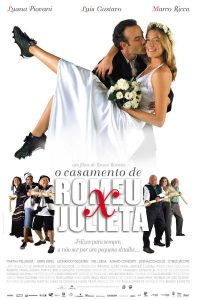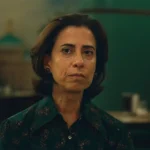By Rogerio Rezende
 Bruno Barreto and Karin Ainouz came to Los Angeles to attend the 2005 Los Angeles Latino Film Festival held at the Egyptian Theater in Hollywood, where the director Barreto showed his film “The Wedding of Romeo and Julie” and Ainouz released his work as a screen writer with Lower City – which was shown in this prestigious festival as well. We were there and took the opportunity to quickly interview with them.
Bruno Barreto and Karin Ainouz came to Los Angeles to attend the 2005 Los Angeles Latino Film Festival held at the Egyptian Theater in Hollywood, where the director Barreto showed his film “The Wedding of Romeo and Julie” and Ainouz released his work as a screen writer with Lower City – which was shown in this prestigious festival as well. We were there and took the opportunity to quickly interview with them.
Soul Magazine: Is there a new trend in Brazilian films happening in Brazil right now?
Bruno Barreto: Yes there is. New Brazilian filmmakers are doing great films. Storytelling now is very interesting. Due to censorship, we did not have the same style of storytelling, but I believe it has been a major factor for this new wave in Brazilian films. Brazil now has a vocation for making films.
Karin Ainouz: I don’t believe there is such a thing like a new filmmaking movement; but a group of people helping each other. Production companies like Video Filmes have been helping the Brazilian filmmaking happen. Brazil had a filmmaking movement in the past, the so-called “Cinema Novo”. Now there isn’t political force behind the film industry like in the 60’s. There are a huge number of Brazilian filmmakers emerging, but there are still structural problems in showcasing their work in Brazil. Recently, the creativity has been great in the Brazilian filmmaking. Check out the online magazine here.
Soul Magazine: Is there an autonomous Brazilian film industry in Brazil and so is there any difference between theirs and the U.S.?
Bruno Barreto: I don’t think the Brazilian film industry is even strong enough, although, we are making a lot of films there. I made my first film here in the U.S in 1989 and it was not a good experience at all. It wasn’t easy and pleasant experience for me to deal with the studio executives here in the U.S. I am very happy been living in Brazil again. It’s a very exciting moment in the Brazilian filmmaking right now, even as hard as it has been very hard to produce a film in Brazil.
 Karin Ainouz: We don’t have a Brazilian film industry and I don’t think that we need one. As a matter of fact, I wish we would never have a commercialized film industry. Yeah, there is quiet an interesting situation in Brazil right now regarding the large number of films is being made.
Karin Ainouz: We don’t have a Brazilian film industry and I don’t think that we need one. As a matter of fact, I wish we would never have a commercialized film industry. Yeah, there is quiet an interesting situation in Brazil right now regarding the large number of films is being made.
Soul Magazine: There is lot of urban violence in mostly and recently Brazilian films. Is this an expression from Brazilian filmmakers?
Karin Ainouz: I don’t agree with it. I don’t think that we’re making a lot of violent movies like a lot of people say we are. I think we should have more of it. I really wish we could have more urban films. Brazilian films are not genre anymore. We have the freedom to make any kind of genre we want to.
Bruno Barreto: Brazilian filmmakers are just telling stories and nothing else. Brazilian films are the mirror of Brazil.
Soul Magazine: Do you Karin as a newcomer film director feel responsible for inspiring new filmmakers?
Karin Ainouz: I feel very excited about this new Brazilian filmmaker’s generation. I am very excited about helping them as well.
Soul Magazine: So what would be your last comment about the Brazilian filmmaking moment?
 Bruno Barreto: I think it’s very exciting that a lot of people in Brazil want to make films now and there are many people who want to see it.
Bruno Barreto: I think it’s very exciting that a lot of people in Brazil want to make films now and there are many people who want to see it.
Karin Ainouz: I think there are many talented people doing films and they’re doing a great job. It’s a great moment for the whole Brazilian filmmaking history. The most recently film work of Karin Ainouz was as co-writer for Lower City (Cidade Baixa). Also, he was the co-writer and director for Madame Satan, and co-script writer for Behind the Sun (Abril Despedaçado).
Bruno Barreto is the co-script writer and director of the acclaimed Dona Flor and Her Two Husbands (Dona-Flor e Seus Dois Maridos), the director of Four Days in September (O Que é Isso Companheiro?), and most recently the co-script writer and director of “The Romeo and Juliet Wedding” (O Casamento de Romeu e Julieta), which film was select to be screened at the 2005 Los Angeles Latino Film Festival closing ceremony and party.
* Rogerio Rezende is a filmmaker and video producer with a cinema degree from UCLA. He lives in Los Angeles for more than fifteen years and is a native from Rio de Janeiro.













